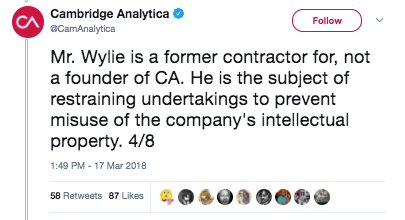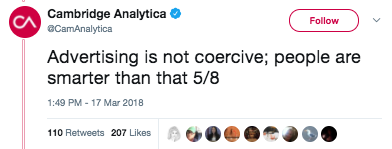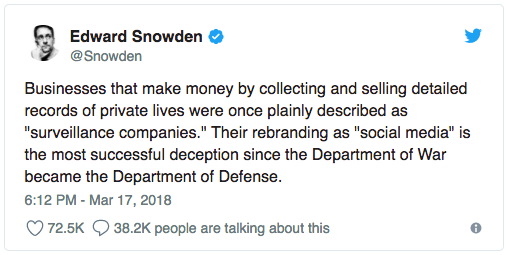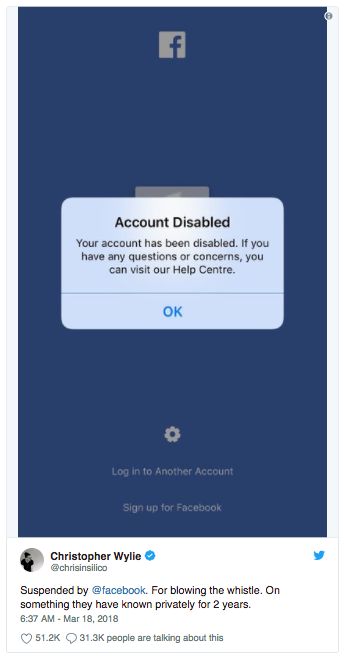What You Need to Know About Facebook's Cambridge Analytica Crisis
Data collected from 50 million Facebook profiles was used by PACs tied to Robert Mercer and by the campaigns of Carson, Cruz, and Trump.
MENLO PARK, CALIFORNIA — Facebook continues to face an unprecedented crisis of plunging share prices, investor lawsuits, calls for government investigations, and a consumer boycott following the revelation that a massive trove of user information was taken without authorization by right-wing political operatives who engaged in a campaign of “psychographic targeting” against U.S. voters.
The campaign was funded by far-right Republican mega-donor and hedge fund billionaire Robert Mercer and disgraced former Trump advisor Steve Bannon.
California-based Facebook, Inc. is reeling from the discovery, as well as from claims that it ignored the massive data breach despite knowing about it for two years. Beside raising hard questions about Facebook’s policies regarding profile data, its retention and its use by private commercial interests, some are questioning whether the social media and advertising behemoth — or even the tech industry as a whole — can survive the storm of controversy. Even Twitter and Snapchat have seen their stocks tumble as rival Facebook takes it on the chin.
Following a long and conspicuous absence from the public spotlight, Zuckerberg finally emerged from hiding Wednesday — through a Facebook status update, of course — to calm worries and offer apologies for the abuse of data, explaining that Facebook “also made mistakes, there’s more to do, and we need to step up and do it.” The message was a definition change in tune from the demand that users are at fault for not paying more attention to their unintelligible, boilerplate privacy settings, but his answer is also five days late and $57 billion short.
The company at the heart of the scandal is Cambridge Analytica, a data analysis and mass outreach firm funded by Mercer, where former Breitbart head and White House chief strategist Bannon served as vice president. The London-based company is an offshoot of Strategic Communications Laboratories or SCL Group, a State Department contractor founded in Britain with offices in Arlington, Virginia. SCL specializes in collecting and analyzing the data of foreign populations suspected to sympathize with militant groups or who reside in countries seen as rivals to the U.S.
While the company denies its wrong-doing, its own claim that “advertising is not coercive” is contradicted by its own Twitter banner that reads “data-driven behavior change.” While a large chunk of internet users have learned to largely tune-out visual advertising — a phenomenon known as ad-blindness — savvy modern advertisers have learned to micro-customize their approach and package it in ways that shape themselves to the cultural, political, geographical and demographic profiles of target audiences — whether it be through catchy jingles, sarcastic memes or fake news of a “liberal” or “conservative” variety. It was precisely this “behavioral microtargeting” approach that Cambridge Analytica sold to prospective clients.
Material that was vacuumed up collected by the data firm through Facebook quizzes — which included detailed psychological profiles of unsuspecting users for the purpose of “behavioral microtargeting” web users — was then used by the campaigns of Ben Carson, Ted Cruz, Donald Trump, and a range of conservative Super PACs tied to Mercer, as well as the Brexit “Leave” campaign.
Facebook’s present crisis is the all-too-predictable result not only of the storing of vast amounts of internet users’ data by unaccountable corporate interests, but also of users growing acclimated to sharing their own data and that of their friends without giving informed consent about how the data is then shared, appraised and sold in the digital marketplace.
Given the inability or unwillingness of governments to regulate the corporate giants of the tech industry — let alone our collective failure to make sense of the end-user agreements foisted on us — it was only a matter of time before our data fell into the hands of political operatives who are part and parcel of the very same financial sector that spawned surveillance capitalism.
The term was coined in 2016 by author and scholar Shoshana Zuboff, who [explained]:
"Surveillance capitalism [is] bred from the clandestine coupling of the vast powers of the digital with the radical indifference and intrinsic narcissism of financial capitalism, and its neoliberal vision that have dominated commerce for at least three decades, especially in the Anglo economies. It is an unprecedented market form that roots and flourishes in lawless space … [S]urveillance capitalism preys on dependent populations who are neither its consumers nor its employees and are largely ignorant of its procedures.”
Watch | Cambridge Analytica: Whistleblower reveals data grab of 50 million Facebook profiles
Operation Mindfuck: Exploiting Facebook to ‘target inner demons’
According to Christopher Wylie, a millennial whistleblower who helped construct the software, Cambridge Analytica was able to gather the data of 50 million users through the savvy manipulation of the social network in an “unethical experiment” meant to entrap people in a “web of disinformation.”
Speaking to The Guardian’s Observer, Wylie said:
"We exploited Facebook to harvest millions of people’s profiles. And built models to exploit what we knew about them and target their inner demons. That was the basis the entire company was built on.”
The report by Observer details how Cambridge academic Aleksandr Kogan developed the app thisisyourdigitallife, which granted his company access to users’ geographic data, likes, locations, gender, political data, ages, as well as a limited amount of data on users’ friends. Around 270,000 people directly used the app, which required Facebook login for access but resulted in the sharing of friends’ information.
Information was also collected from volunteers recruited through Amazon’s crowdsourcing platform, Mechanical Turk. Turkers were paid a dollar to take a personality test on the pretext that the data would be used by academic researchers. Nearly $1 million was spent by Cambridge Analytica to harvest information, after which it was collected, stored, and shared among conservative campaign committees.
Wylie, a data analytics expert who describes himself as a gay Canadian vegan, eventually shared various emails, invoices, bank transfer records and other material with authorities in the U.K. and U.S. to drag “Steve Bannon’s psychological warfare mindfuck tool” into the public spotlight.
According to the Observer, Wylie “had no clue that he was walking into the middle of a nexus of defense and intelligence projects, private contractors and cutting-edge cyberweaponry.”
Mercer and Bannon allegedly described their operation as a military-style psy-ops campaign, which first targeted voters for the Cruz campaign before Cruz folded and Mercer threw his weight behind the Trump campaign in August 2016 — at which point he installed Steve Bannon and Kellyanne Conway as top lieutenants and advisors to the former host of NBC’s “The Apprentice.”
Mercer also gave the reality television star a $5 million contribution, but Cambridge Analytica’s vast trove of data may have been far more valuable to Trump’s successful run for the presidency, especially when used alongside automated Facebook ads and voter files from the Republican National Committee.
Bannon, whose dramatic exit from the White House months ago was accompanied by a din of “Sloppy Steve” insults from the president, was most recently seen rallying white nationalists in France. Beyond his nationalist extremism, the former White House aide is known for his history of bare-knuckle, Machiavellian political maneuvering, which includes double-dealing, smear campaigns and dirty tricks. His lawyers claim that he was in the dark about the claims regarding Cambridge until the bombshell reports were released.
Commenting on the media firestorm resulting from the scandal — and the utterly obvious fact that our personal data is chronically misused by Silicon Valley — tech critic and author Evgeny Morozov tweeted:
"Surveillance capitalism, enabled by data extractivism, is used to sell us junk products and offer free services. Good! Innovation!
Surveillance capitalism, enabled by data extractivism, is used to sell us junk politics. Bad!
Innovation wins.”
Watch | Rebel Geeks – Give Us Back Our Data
A surveillance capitalism buffet for “the clients”
On Tuesday, a further layer was added to the scandal when it was revealed that military contractor SCL Group has had an open contract since February 2017 with the State Department’s Global Engagement Center (GEC) – for the purpose of “target audience research” and countering the propaganda efforts of ISIS.
The GEC — a counter-propaganda initiative by the State Department, established by the Obama administration first to counter ISIS online propaganda and then to counter alleged “Russian meddling” — was reported on by MintPress News earlier this month. In the words of Trump administration officials, the center’s role is to use social media platforms to wage an “aggressive response to malign influence and disinformation (and) leverage deeper partnerships with our allies, Silicon Valley, and other partners in this fight.”
On SCL Group’s website, the company describes its ability to give government and military clients the capacity to reach audiences in a “highly targeted” manner through behavioral change programs and reach specific audiences through “channels such as social media; and indirect channels such as third-party endorsements and network affiliations. Every campaign is measured and evaluated: we execute a truly quantifiable approach to engagement, which ensures maximum efficiency of spending.”
Watch | The Power of Big Data and Psychographics
Offering campaign examples, the SCL website boasts of its role assisting public diplomacy and data collection efforts meant to combat “extremist recruitment across the South and South East Pacific;” its role helping to boost the credibility of Ukraine’s pro-U.S. government in Kiev; its effort to stem “anti-social behavior” by Nepal’s Maoist insurgents; social outreach and data acquisition efforts in Libya; and engagement efforts in Afghanistan and Pakistan. Each campaign is noted as work on behalf of “the client,” presumably governments aligned with U.S. corporate interests and foreign policy dictates.
Commenting wryly on the connection between Cambridge Analytica’s psychological targeting operation and the SCL Group’s ties to U.S. imperialism’s attempts to “win hearts and minds” abroad, Morozov tweeted:
"What barely comes through this story is that Cambridge Analytica and especially the SCL Group emerged, by and large, due to lots of Western government contract money targeting opinion change abroad — by means of social media. ‘Public diplomacy 2.0’ they used to call it!”
Since last Friday, SCL Group and Cambridge Analytica have been suspended by Facebook from accessing any platforms owned by the company. Curiously, even Wylie the whistleblower has been banned from accessing his profiles, including those on WhatsApp and Instagram.
Adding further venality to the firm’s reputation, former Cambridge Analytica CEO Alexander Nix was caught on camera in a video released this week boasting about the use of illegal tactics in political campaigns, including blackmail and the use of “honeypot” schemes — pre-arranged encounters between sex workers and Cambridge clients’ electoral opponents — as well as bribery offers, which are videotaped and subsequently used as compromising material or “instant video evidence of corruption.”
Watch | Facebook loses $40bn in share value over user data scandal
Our outrage, Zuck’s PR nightmare
In a step-by-step guide to blocking third-party Facebook “partners” from accessing personal information using the network’s Platform API settings, tech watchdog group Electronic Frontier Foundation noted:
"In addition to raising questions about Facebook’s role in the 2016 presidential election, this news is a reminder of the inevitable privacy risks that users face when their personal information is captured, analyzed, indefinitely stored, and shared by a constellation of data brokers, marketers, and social media companies.”
Faced with this devastating scandal, the social media corporation has responded with a haphazard mixture of denials, investor in-fighting, and silence. CEO Mark Zuckerberg, a founder and prominent public face of the social network, waited an excruciating five days before issuing any public comment in response to the scandal.
Critics have long accused Facebook of allowing little transparency despite the fact that it wields a monopoly-like power to mediate information access, while facing little to no accountability over how it uses its “gatekeeper” role and the data of its 2.2 billion users.
It is now expected that authorities in Europe and the United States will subject the company to a long-overdue round of deep scrutiny, causing a foreboding sense of anxiety among the tech giant’s investors.
As recently as January, Zuckerberg sought to soothe the nerves of critical shareholders by offering a New Year pledge to fix Facebook’s “issues” and help make the world a better a place by stressing the “deeply human” nature of the platform’s communities.
Watch | Facebook to hold crisis meeting without Zuckerberg
On Monday alone, Zuckerberg’s net worth has declined by over $5 billion while the company’s share value plummeted by around $36 billion. According to the latest figures, Facebook’s market value has fallen by 10.5% or $57 billion. Perhaps his New Year resolution should have included addressing the brewing storm resulting from his seeming lack of interest in securing user data — measures that may have saved him the humiliation of breaking his silence before furious consumers and Facebook shareholders on the verge of mutiny.
Either way, confidence in the social media giant is quickly fading, as investors and users alike wonder whether this is the tip of an iceberg revealing the depth and scale of data misuse by the public-private partners helming the U.S. digital economy.
The scandal should make clear to internet users the extent to which Silicon Valley, — rather than simply big, bad Moscow alone, — is culpable in the “hacking of U.S. democracy” and the “interference” in public life conducted by those who manipulate society to advance their own profit-driven interests.
Top Photo | The logo of the social network “Facebook” is reflected in the pupil of an eye. (Photo: Joerg Koch/DAPD)
Written by Elliott Gabriel. // This article is Creative Commons. // See the original.
Find us:
Online --> MintPressNews.com
On Twitter --> @MintPressNews
On Facebook --> @MintPressNewsMPN
On Instagram --> @MintPress
On Patreon --> Patreon.com/MintPressNews
Written by Elliott Gabriel. // This article is Creative Commons. // See the original.
Find us:
Online --> MintPressNews.com
On Twitter --> @MintPressNews
On Facebook --> @MintPressNewsMPN
On Instagram --> @MintPress
On Patreon --> Patreon.com/MintPressNews







Whether or not Russia had any significant influence in determining our election still seems fuzzy at best to me, though there are things about that story that give me pause and I can't discount it entirely.
At the end of the day, one thing we can count on is politicians to reach out and use any malicious and dirty tactics they can to gain the upper hand... This part, at least, should be of no surprise to any of us who are paying attention.
And even if Russia did meddle in our election or attempt to influence it some how, it's not like the U.S. government can honestly criticize them without being ridiculously hypocritical. Manipulating elections to enact one's own personal regime and agenda is something the U.S. has mastered.